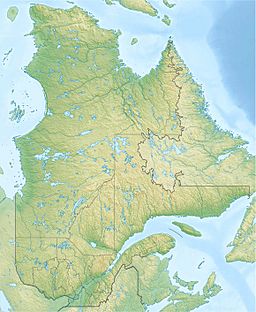Saint-Henri Lake facts for kids
Quick facts for kids Saint-Henri Lake |
|
|---|---|
| Location | Lac-Croche (TNO), La Jacques-Cartier Regional County Municipality, Capitale-Nationale |
| Coordinates | 47°42′32″N 71°55′47″W / 47.70889°N 71.92972°W |
| Lake type | Natural |
| Primary inflows | (clockwise from the mouth) Métabetchouane River (coming from the south-east via Hugh Lake), des ruisseaux riverains, la décharge du lac Desève, la décharge du lac Gagné et la décharge du lac Roublard. |
| Primary outflows | Métabetchouane River |
| Basin countries | Canada |
| Max. length | 7.0 km (4.3 mi) |
| Max. width | 1.15 km (0.71 mi) |
| Surface elevation | 413 m (1,355 ft) |
Lac Saint-Henri is a freshwater lake located in Quebec, Canada. It's part of a special area called the Laurentides Wildlife Reserve. The Métabetchouane River flows right through this lake.
You can reach Lac Saint-Henri using a main road called Route 155. This road connects the towns of La Tuque and Chambord. There's also a forest road, R0410, that goes north of the lake. Other smaller forest roads help people get to the area for different activities.
The main activities around the lake are cutting down trees, known as forestry. After that, enjoying nature and outdoor fun, called recreational tourism, is the second most popular activity.
The surface of Lac Saint-Henri usually freezes over from early December until the end of March. However, it's generally safe to walk or play on the ice from mid-December to mid-March.
Contents
About Lac Saint-Henri's Location
Lac Saint-Henri is surrounded by several important water areas. These are like the "neighbors" of the lake.
- To the north: You'll find the Métabetchouane River, Métascouac Lake, Métabetchouane Lake, and the Moncouche River.
- To the east: There's Corneillier Lake, Frenette Lake, the Métascouac River, the Métascouac South River, the Métabetchouane East River, Jacques-Cartier Lake, and the Jacques-Cartier River.
- To the south: You'll see the rivière de la Place, the Métabetchouane River, and the Métabetchouane East River.
- To the west: There's Ventadour Lake, Lescarbot Lake, the Grand Bostonnais River, and the Aberdeen River.
Lake Size and Features
Lac Saint-Henri is about 7.0 km (4.3 mi) long and 1.15 km (0.71 mi) wide. It sits at an elevation of 413 m (1,355 ft) above sea level.
The lake gets most of its water from the Métabetchouane River. This river flows into the lake from the southeast, passing through Hugh Lake first. Other smaller streams and outlets from nearby lakes like Lake Desève, Lake Gagné, and Lake Roublard also feed into Lac Saint-Henri.
In the middle, the lake becomes narrower because of two peninsulas that are only about 170 m (560 ft) apart. The Métabetchouane River flows through the lake for about 6.1 km (3.8 mi) as it heads north.
Where the Water Goes
The water from Lac Saint-Henri flows out from its northern end.
Here are some distances from the lake's exit point:
- 0.4 km (0.25 mi) south of the R0410 forest road bridge.
- 8.9 km (5.5 mi) east of Ventadour Lake.
- 13.3 km (8.3 mi) east of Lescarbot Lake.
- 4.6 km (2.9 mi) west of the Métascouac River.
- 22.1 km (13.7 mi) east of the Canadian National Railway tracks.
- 20.2 km (12.6 mi) southwest of Lac aux Écorces.
- 28.5 km (17.7 mi) northeast of the village of Lac-Édouard.
- 75.8 km (47.1 mi) southeast of where the Métabetchouane River meets Lac Saint-Jean.
From Lac Saint-Henri, the water travels a long way:
- First, it flows along the Métabetchouane River for about 109.8 km (68.2 mi) towards the northwest.
- Then, it enters Lac Saint-Jean and travels about 22.25 km (13.83 mi) northeast to a spot called La Petite Décharge.
- Finally, the water flows through the Saguenay River via La Petite Décharge for about 172.3 km (107.1 mi) eastward. It eventually joins the Saint Lawrence estuary near Tadoussac.
Naming the Lake
The name "Lac Saint-Henri" was officially recognized on December 5, 1968. This was done by the Commission de toponymie du Québec, which is the organization responsible for naming places in Quebec.
 | William L. Dawson |
 | W. E. B. Du Bois |
 | Harry Belafonte |


